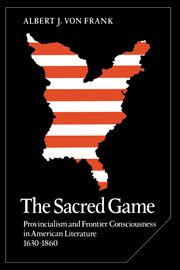Book contents
- Frontmatter
- Contents
- Dedication
- Preface
- Introduction: provincialism and the frontier
- 1 “But enmity this amity did break”
- 2 Brother Jonathan
- 3 “A musy in the thicket”
- 4 Geoffrey Crayon and the gigantic race
- 5 Hawthorne's provincial imagination
- 6 Working in Eden
- 7 Life as art in America
- 8 Reading God directly: the morbidity of culture
- Postscript: tradition and circumstance
- Notes
- Index
3 - “A musy in the thicket”
Published online by Cambridge University Press: 07 October 2011
- Frontmatter
- Contents
- Dedication
- Preface
- Introduction: provincialism and the frontier
- 1 “But enmity this amity did break”
- 2 Brother Jonathan
- 3 “A musy in the thicket”
- 4 Geoffrey Crayon and the gigantic race
- 5 Hawthorne's provincial imagination
- 6 Working in Eden
- 7 Life as art in America
- 8 Reading God directly: the morbidity of culture
- Postscript: tradition and circumstance
- Notes
- Index
Summary
It would seem to me, that a philosopher ought to know how to write, or at least to read.
– H. H. BrackenridgeThe frontier often had a prismatic effect on British culture. We have already seen how the frontier struggle to reproduce culture could set style against content; but content itself was never wholly unitary, and so it too was frequently broken up into culturally more manageable elements. The idea of the gentleman in The Contrast is a case in point: Edwin H. Cady has described the dramatic tension in Tyler's play in terms of a nearly schematic opposition of two contradictory English traditions – the fine gentleman, represented by the Chesterfieldian Billy Dimple, and the natural or Christian gentleman, represented by Colonel Manly, whose character, Cady argues, owes much to Sir Charles Grandison. Seen from this perspective, the play sets forth in relatively unequivocal terms the dilemma of a habitually imitative people who find themselves faced with a choice between two contradictory British modes or models.
Although Americans were willing, even eager, to affirm the cultural standards of England, they were not always certain what those standards were. Colonials who viewed English ideas with an eye to modifying their own behavior found ambiguity naturally distressing.
- Type
- Chapter
- Information
- The Sacred GameProvincialism and Frontier Consciousness in American Literature, 1630–1860, pp. 42 - 60Publisher: Cambridge University PressPrint publication year: 1985



